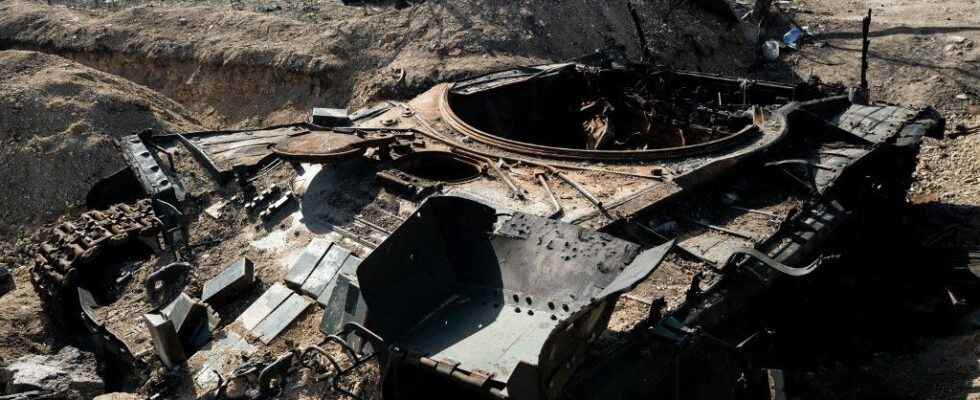The historian and journalist Pierre Servent, expert in military strategy and specialist in defense issues, is the author of Tomorrow’s world – Understanding the planetary consequences of the Ukrainian shock wave (Robert Laffont). For L’Express, he analyzes the latest developments in the war in Ukraine.
L’Express: After a year of war, the situation on the ground seems confused. Where are we really?
Peter Servent: The confusion comes in part from the fact that a civilian gaze, impregnated with the rhythm of the media, is placed on military operations. It is also linked to the fog of war, a classic expression that concerns all wars.
What can be read on the map is that the Russians have launched an offensive several months ago over approximately 700 kilometers of front, and particularly on Bakhmout. They seek to break through the Ukrainian forces with successive waves, putting the less professional in the front line. They have already launched their very broad offensive, seeking to saturate the Ukrainian defenses with the mass of their fighters. For now, they nibble. Prigojine had promised Putin the capture of Bakhmout seven months ago… I consider that the Ukrainians are winning the defensive battle. But the defensive battle is what allows the French, for example, in 1916, to block the German offensive on Verdun. When they have sufficiently exhausted the Russian forces – and they are exhausting themselves – they will try to create panic among the Russians. I’m sure they’re thinking about it.
They have very solid intelligence, thanks to their drones, to the satellite resources of their allies. Putin is trying, for his part, to build a high-intensity army. Because a disparate Russian military corps, mercenaries from Wagner just released from prison, separatist militiamen from Donbass and Chechens from Kadyrov better able to use their cameras to take selfies than to use their weapons, this does not not an army, especially in a Soviet-type system, with centralized command and a lack of coordination between the different forces. The invasion body is, in my opinion, very fragile today, and the possibility of a break cannot be ruled out.
Volodymyr Zelensky said he wanted to do everything “to achieve victory this year”. Is this objective credible, or is the declaration only aimed at mobilizing Ukraine and its supporters?
It is of course a discourse with a political and psychological aim. Two scenarios emerge. A scenario in vogue today, and based on solid arguments, is that of a long war, another year, two years, three years, with a kind of balance of power on a fault line. The other scenario, which I favor, is that of an implosion of the Russian system, due to its heterogeneous nature and its supply difficulties. The Americans are talking about possible military aid from China, strengthening ties with Iran. These clues show that Putin thinks he has time to recover, but for the moment he is in the trough. Ukraine has an army 3.0, strong in the intelligence of its command, the presence of Western equipment, even if Kiev keeps saying that it does not have enough ammunition – which is not fake. I would bet rather on a collapse or fractures of the Russian front.
Did Vladimir Putin’s speech last week bring any new elements?
On the one hand, nothing new under the sun: conspiracy of the West, historic lands. But I found the very long passage on the economy interesting. Putin basically says “not badly at all”, but also claims that he will lower interest rates on real estate. The warnings to the oligarchs, some of which we can imagine will start to go through the windows again, show that the country is suffering financially. In addition, Putin made another admission of failure by returning to the conditions for financing combatants and their families. He is very attentive to the signals coming from the field, from the families whose silence will have to be bought more and more expensively. In hollow, the Kremlin has therefore noted two major weaknesses.
“Those who dismiss the United States and Russia back-to-back are committing a major intellectual fault”
Doesn’t Joe Biden’s visit raise fears of an escalation of the conflict?
This first visit of Biden to kyiv obviously has an important relief. But the escalation in horror, terror, massacres, the beginnings of genocide, it is the Russian expeditionary force which is responsible. Westerners have chosen a graduated response. Some regret that this gradation is too marked. It is the Kremlin, and it alone, that threatens to use nuclear weapons. Joe Biden comes to the support of a martyred country. There is no escalation, but a desire for control.
Some observers make the conflict in Ukraine the clash of two imperialisms, that of Russia and that of the United States. What do you think ?
I disagree with these theories. I condemned the invasion of Iraq by the United States, carried out against a background of State lies. It was a fault, and even a crime. But those who dismiss the United States and Russia back to back are committing a major intellectual fault. The United States invaded Iraq, they did not annex it claiming to recover historic lands. Putin has a plan for military domination of his environment and displays a cynical contempt for international law (think of Georgia, Chechnya, Syria). Russia did not interest anyone – except Germany for cheap energy – it is an underdeveloped country in the true sense of the term. I disagree with this relativism. Have western democracies always lived up to their ideal? No. But predation, destruction, are the cardinal rule in totalitarian regimes; in democratic regimes, there is the press, checks and balances… I usually say that the worst democracy is worth a thousand times the “best” (if it exists, which I doubt) of totalitarian regimes .
